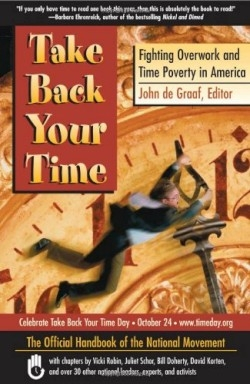Take Back Your Time
Fighting Overwork and Time Poverty in America
“I don’t have enough time” has become a common excuse for busy Americans. It’s the reason people skip exercise, rarely share family meals, miss a child’s school play, bypass volunteer activities, eat fast food, and hire pet sitters instead of walking the dog themselves.
Overwork and lack of time are epidemics in America. Many companies expect-indeed, some even require-employees to work overtime. Most people are so squeezed with deadlines that they spend well more than forty hours a week at work, leaving little time to nurture families, improve health, tend to the environment, boost communities, or simply relax.
The authors take aim at this workaholic culture that values materialism over free time. The book, with contributions from more than thirty academics, journalists, and activists, edited by the coauthor of Affluenza, is the official handbook for “Take Back Your Time Day,” set for October 24. Organizers hope that the day will raise awareness of what they call “time poverty,” and spur workplace improvements.
The book’s revelations are startling, and often depressing. For example, by mid-October, Americans will have worked as many hours as the average European does in a full year. In 1933, the Senate passed a bill that would have made a thirty-hour work week the national standard, but the bill never became a law. Lawmakers in this country once believed that America would be facing a crisis of too much leisure time because of improvements in technology and productivity. In 1965, the Senate predicted that the work week would shrink to fourteen hours.
Married couples ages twenty-five to fifty-four worked 388 more hours in 2000 than they did in 1979, a twelve percent increase. These couples spend just twelve minutes a day talking to each other. In 2002, American workers gave employers a $20 billion gift by not taking 175 million hours of paid vacation owed them.
Take Back Your Time is definitely an activist’s handbook, providing some interesting solutions for reclaiming the time that Americans now spend at work. The authors advocate for: overtime caps; laws eliminating mandatory overtime; paid sabbaticals, financed through a worker’s social security contributions; job sharing arrangements; an increase in paid vacation time; and a shorter standard work week.
The authors could have improved the book by offering more practical tips for individuals seeking to carve out more time in their own lives. That’s perhaps the biggest failing of an otherwise enlightening book. Being an activist takes time-the one commodity that working Americans don’t have.
Disclosure: This article is not an endorsement, but a review. The publisher of this book provided free copies of the book to have their book reviewed by a professional reviewer. No fee was paid by the publisher for this review. Foreword Reviews only recommends books that we love. Foreword Magazine, Inc. is disclosing this in accordance with the Federal Trade Commission’s 16 CFR, Part 255.

